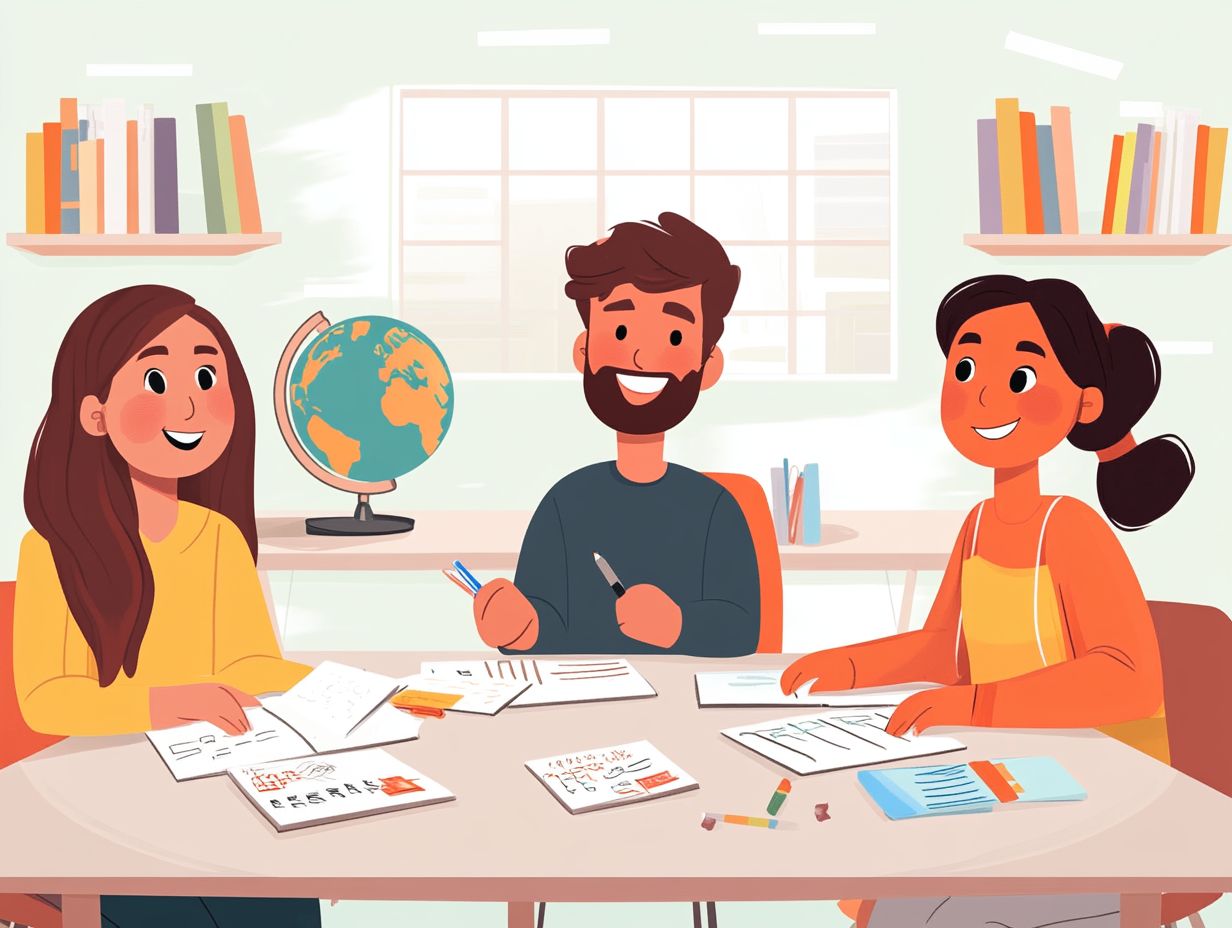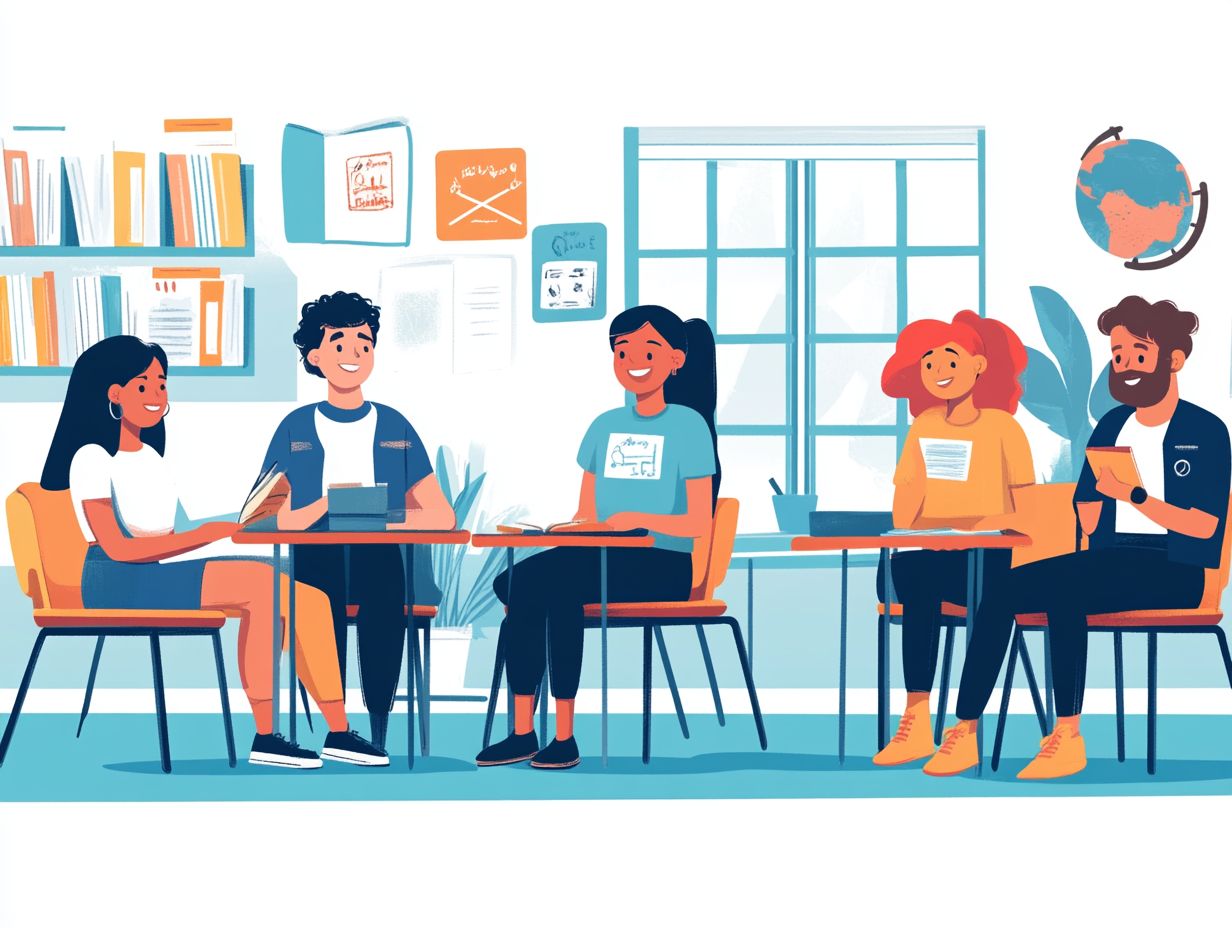5 Language Learning Techniques for Fast Results
Embarking on the journey to learn a new language is an adventure that blends excitement with a touch of trepidation. Are you excited to dive into the amazing world of languages? Let s explore together!
Whether your goal is to travel the globe, elevate your career, or simply broaden your horizons, employing effective strategies can significantly enhance your experience. This article delves into five powerful techniques designed to accelerate your language learning, from immersing yourself in the culture to engaging in conversation with native speakers.
It also addresses the challenges you may encounter, the pivotal role of technology, and ways to sustain your motivation throughout the process.
Contents
- Key Takeaways:
- 1. Immerse Yourself in the Language
- 2. Practice Speaking with Native Speakers
- 3. Use Flashcards and Other Memory Aids
- 4. Watch Movies and TV Shows in the Language
- 5. Set Realistic Goals and Track Your Progress
- How Long Does It Take to Learn a New Language?
- Frequently Asked Questions
- What are the 5 language learning techniques for fast results?
- How does immersion help in language learning?
- What is spaced repetition and how does it aid in language learning?
- Why is active learning important in language learning?
- How does goal-setting contribute to fast results in language learning?
- What are mnemonics and how can they be used in language learning?
Key Takeaways:

- Immerse yourself in the language by surrounding yourself with native speakers, listening to music and podcasts, and reading in the language.
- Practice speaking with native speakers to improve your fluency and pronunciation.
- Use flashcards and other memory aids to help you remember new words and phrases.
1. Immerse Yourself in the Language
To truly master a foreign language, immersing yourself in that linguistic environment is crucial. Engaging with native speakers not only helps you grasp cultural nuances but also enhances your vocabulary retention.
This immersive journey can manifest in various ways, whether it’s living abroad for a few months or diving into language-rich media like films, music, and podcasts. Language experts consistently emphasize the importance of interacting with local communities.
For instance, Benny Lewis champions the idea of seeking out speaking opportunities, no matter where you stand on the skill spectrum. Whether you decide to join a meetup group or dive into online forums, these interactions will undoubtedly boost your fluency and confidence.
By fully surrounding yourself with the target language, you stimulate your brain s capacity to acquire vocabulary and comprehend context with greater ease.
2. Practice Speaking with Native Speakers
Practicing conversation with native speakers significantly elevates your fluency. This allows you to break through language barriers and enhance your overall proficiency through real-time feedback and interaction.
Platforms like italki.com are invaluable in this journey, providing you with access to a vibrant community of native speakers eager to share their language expertise. By participating in structured language classes, you deepen your understanding while enjoying personalized lessons tailored specifically to your needs.
These classes not only boost your confidence but also offer critical opportunities for constructive feedback, helping you tackle specific challenges head-on. You can also use tools like video sessions or language exchange forums to enrich your immersive experience.
3. Use Flashcards and Other Memory Aids
Utilizing flashcards and other memory aids is a highly effective strategy for bolstering your memory skills and enhancing vocabulary retention. This approach allows you to swiftly grasp new words and phrases through repetitive exposure and a bit of trial and error.
Not only does this method reinforce your memory, but it also engages you in a more interactive learning process. Consider digital flashcard apps like Anki and Quizlet, which come equipped with innovative features like spaced repetition to ensure optimal review intervals for maximum retention.
Research has demonstrated that techniques involving spaced repetition can lead to significant improvements in long-term memory. If you’re looking for additional resources, online platforms like Duolingo and Memrise offer comprehensive lessons and tutorials.
Exploring these tools can elevate your language acquisition journey, making the process not just effective but also enjoyable.
4. Watch Movies and TV Shows in the Language

Watching movies and TV shows in your target language is more than just fun; it helps you surround yourself with the language and explore its culture. This approach improves your understanding and makes conversations feel easy and natural.
Dive into engaging stories and meet characters that you’ll love. Take Disney classics like “Coco” or “Moana.” They not only entertain but also bring cultural traditions to life, making the language feel personal.
Listening to catchy songs by artists like Shakira boosts your listening skills and vocabulary. The rhythm and melody make it easier to remember phrases, making learning enjoyable.
As you enjoy these familiar mediums, your listening comprehension improves. You’ll gain insights into the everyday lives of native speakers, enriching your language journey.
5. Set Realistic Goals and Track Your Progress
Setting realistic goals and tracking your progress can significantly boost your motivation. This method enhances your language skills and gives you a sense of achievement.
Using the SMART criteria specific, measurable, achievable, relevant, and time-bound helps you create clear objectives. You can utilize various apps to monitor your progress effectively.
These tools often include reminders and interactive challenges, keeping you committed to your goals. By holding yourself accountable, you can celebrate your milestones and adjust your strategies as needed.
How Long Does It Take to Learn a New Language?
The time it takes to learn a new language can vary. Factors like the language’s complexity, your experience, and your practice consistency all play a role.
For example, Mandarin has a steeper learning curve due to its tonal nature and writing system compared to Spanish. Research shows that immersive experiences, such as speaking with native speakers, can significantly speed up your learning, as highlighted in 5 lessons from polyglots.
The Foreign Service Institute suggests that reaching conversational proficiency in Spanish might take about 600 hours, while Mandarin may require around 2,200 hours. Using language apps, tutors, and exchange programs can help reduce this time. Consistent practice is your secret weapon for fluency.
What Are Some Other Effective Language Learning Techniques?
Many effective language learning techniques go beyond traditional methods. Explore options like language podcasts, conversational practice, and the 5 must-have resources for language learning success to elevate your skills.
Podcasts are versatile tools for immersion in different contexts and accents. For instance, “Coffee Break Languages” offers bite-sized lessons for your busy life.
Using language games like Duolingo or Babbel makes learning enjoyable and boosts your vocabulary retention. These resources combine listening with interactive engagement, helping you build a strong foundation in your target language.
How Can Technology Help with Language Learning?

Technology is a game changer in modern language learning. It offers a wealth of online courses and language resources.
Apps like Duolingo and Babbel let you practice at your own pace and convenience. This makes learning a language more accessible than ever!
Websites like iTalki and HelloTalk connect you with native speakers. You can have real-time conversations and bridge geographical gaps.
You can immerse yourself in your target language through podcasts and video tutorials. This convenience means you can learn anytime, anywhere.
These advancements enhance your flexibility and create a more engaging and personalized learning experience.
What Are the Benefits of Learning a New Language?
Learning a new language offers many advantages. It boosts your cognitive abilities and communication skills.
It also helps you connect with bilingual individuals and enriches your personal and professional experiences. Knowing two languages sharpens your memory and multitasking abilities.
Dr. Ellen Bialystok states that “learning a language engages the brain in complex ways.” This fosters problem-solving skills and creativity.
Proficiency in a foreign language can expand your career opportunities. Companies seek employees with linguistic skills in our interconnected world.
Immersing yourself in another culture deepens your understanding. It nurtures empathy and open-mindedness, allowing for deeper connections and a richer life perspective.
What Are the Most Common Challenges in Language Learning?
Language learners face challenges like memory retention and pronunciation issues. These can slow down your progress.
To overcome these hurdles, use various strategies tailored to your needs. For example, language apps can significantly enhance your vocabulary and pronunciation.
Set specific, achievable goals to boost your motivation. This helps you track progress and celebrate those small victories!
Consistent practice is essential, whether conversing with native speakers or doing daily writing exercises. It builds your confidence and paves the way for fluent communication.
How Can One Stay Motivated While Learning a New Language?
Staying motivated can be tough during your language learning journey. Incorporating getting feedback from others and joining the language community can significantly boost your motivation.
Join language groups where learners share experiences and celebrate progress. Setting achievable milestones gives you a satisfying sense of accomplishment.
Engage with fun resources like podcasts, films, or music in your target language. This keeps your mind actively engaged!
By building a routine with these enriching elements, you turn language learning into a rewarding adventure that keeps your motivation high.
Frequently Asked Questions

What are the 5 language learning techniques for fast results?
Want to learn a new language quickly? Here are five powerful techniques, including fun techniques to enjoy learning a language, that can fast-track your progress!
The 5 most effective language learning methods for fast results are immersion, spaced repetition, active learning, goal-setting, and using mnemonics.
How does immersion help in language learning?
Immersion means surrounding yourself with the language. This can be through watching shows, listening to music, or talking to native speakers.
This approach helps develop a natural understanding and fluency in the language.
What is spaced repetition and how does it aid in language learning?
Spaced repetition involves regularly reviewing material at increasing intervals of time.
This technique helps with long-term retention of vocabulary and grammar rules.
Why is active learning important in language learning?
Active learning involves engaging with the language through speaking, writing, and using it in real-life situations.
This allows for practical application and better retention of the language.
How does goal-setting contribute to fast results in language learning?
Set clear and achievable goals to supercharge your motivation!
Setting specific objectives helps you stay focused while learning a new language.
This allows you to track progress and celebrate milestones.
What are mnemonics and how can they be used in language learning?
Mnemonics are simple tools that help you remember things. They can be acronyms or visual associations.
These can be used to remember vocabulary, grammar rules, and other language concepts.
Start setting your language goals today and watch your skills soar!




